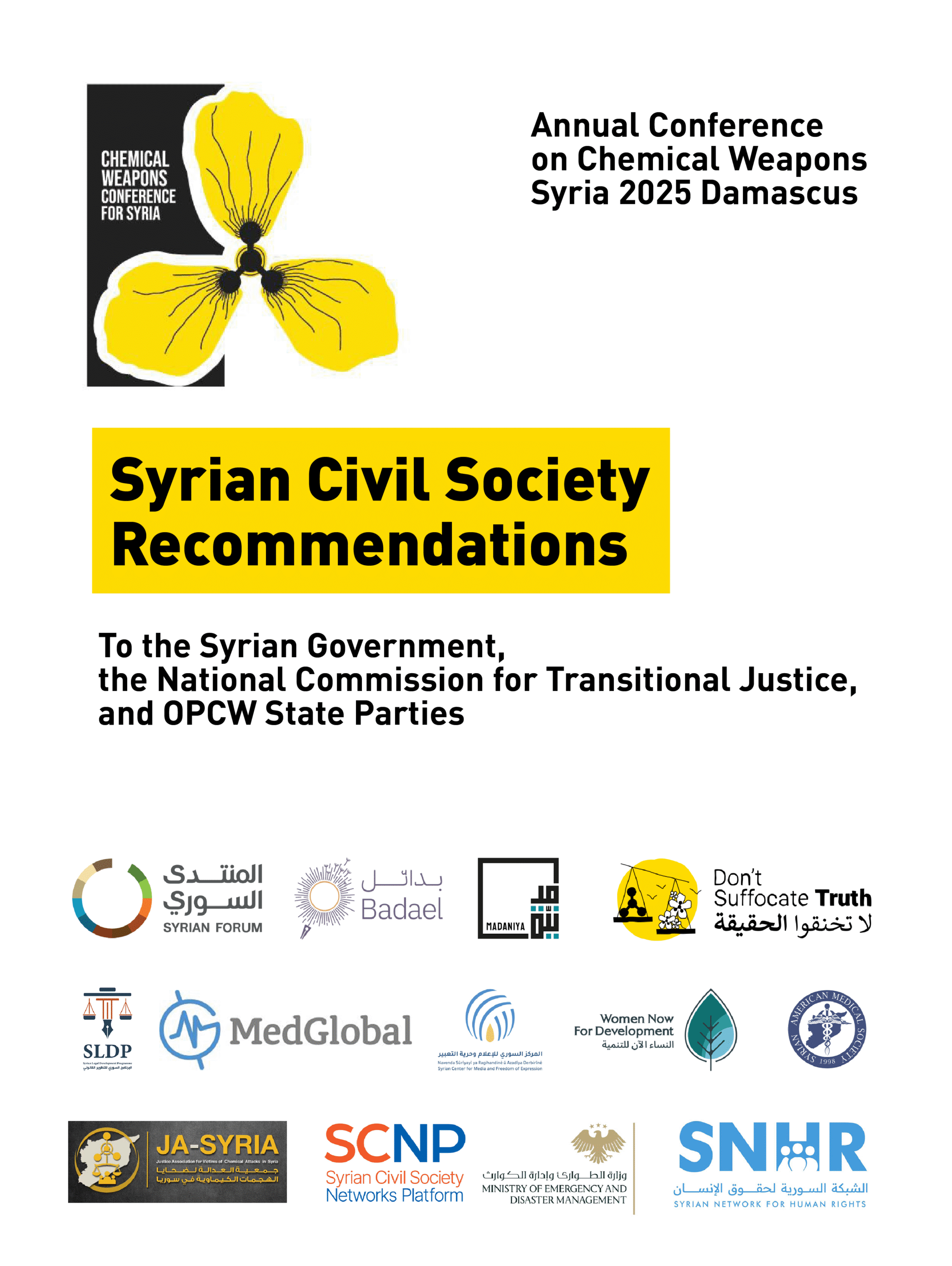Oct 1, 2025 | This post is also available in: Arabic

Syrian Civil Society Recommendations to the Syrian Government, the National Commission for Transitional Justice, and State Parties to the OPCW
TO THE SYRIAN GOVERNMENT
Ensure a Holistic National Response to CW across Ministries and within Transitional Justice Framework
A holistic approach to transitional justice requires that the Syrian government coordinate efforts across all relevant ministries (including justice, health, social affairs, and foreign affairs) together with the National Commission for Transitional Justice. The government has a duty to guarantee that each ministry incorporates transitional justice considerations into its sectoral strategies related to CW, thereby fulfilling Syria’s obligations under international human rights and international humanitarian law.
Ratify the Rome Statute of the International Criminal Court (ICC)
The Syrian government should ratify the Rome Statute of the International Criminal Court (ICC). This step is crucial not only to enable Syria’s engagement with international accountability mechanisms but also to serve as a structural guarantee of non-repetition, ensuring that future violations of this scale and nature are deterred through credible avenues for justice.
Continue Full Transparency and Compliance with OPCW Obligations
The Syrian government should continue to engage and cooperate in a genuine and transparent manner with the Organisation for the Prohibition of Chemical Weapons (OPCW), including by providing full disclosure of CW sites, production facilities, and stockpiles. The government must also ensure the destruction of remaining CW traces within the country, in compliance with OPCW verification standards.
TO THE NATIONAL COMMISSION FOR TRANSITIONAL JUSTICE
Implement a Comprehensive Survivors-Based Approach to Truth, Justice, Reparations, and Non-Recurrence
The National Commission on Transitional Justice bears the responsibility of designing and implementing a comprehensive strategy that integrates truth-telling, accountability, reparations, and institutional reforms to address the use of Chemical Weapons by the former regime of Bashar al-Assad and ISIS. International standards emphasize the indivisibility of these pillars.
Ensure Criminal Justice Reforms to Effectively Prosecute CW-related Crimes, including by advocating for the Ratification of the Rome Statute
The National Commission for Transitional Justice, as an independent body, should play an active role in advocating for Syria’s ratification of the Rome Statute of the International Criminal Court (ICC). In parallel, it should also promote reforms to align Syrian legislation with international criminal law and human rights standards, ensuring that chemical weapons–related crimes, alongside other core international crimes, are properly codified in domestic law and can be effectively prosecuted.
Integrate Domestic Transitional Justice with International Universal Jurisdiction Proceedings
The National Commission for Transitional Justice should establish mechanisms to engage with ongoing universal jurisdiction cases abroad. This includes systematically documenting evidence and coordinating with relevant Syrian civil society organizations, including CW survivors-led groups, and foreign prosecutors. Such integration not only strengthens the credibility of domestic transitional justice measures but also ensures that Syrian victims benefit from accountability processes outside Syria. A fragmented approach that ignores UJ proceedings risks duplicating efforts and undermining victim-centred justice.
Develop Effective Institutional Coordination with International Investigative Mechanisms
The National Commission for Transitional Justice should establish effective institutional coordination procedures and channels with international mechanisms that have documented and collected evidence of CW-related crimes in Syria in the past decade, including the CoI, IIIM and OPCW-mandated entities (FFM, JIM, IIT). The coordination should ensure evidence preservation, consolidation and access to evidence for future domestic prosecutions, in accordance with international law standards.
Apply a Gender-Sensitive Approach to Chemical Weapons-Related Violations
The National Commission for Transitional Justice must ensure that its truth, justice, and reparations strategies incorporate a gender-sensitive perspective in relation to the impact of chemical weapons attacks. Women and girls, as well as men and boys, experienced differentiated harms, including health consequences. Reparations programs must reflect these gendered harms, ensuring access to healthcare and psychosocial support. Such commitment to a gender-sensitive approach must be grounded on and built upon the expertise and experiences of Syrian civil society organizations, including women-led organizations and CW-survivors led groups, which had led this work in the past decade.
Guarantee Victim/Survivor-Centered Approach and Civil Society Engagement and Partnerships in Transitional Justice Processes
The National Commission for Transitional Justice should institutionalize mechanisms to ensure the meaningful participation of victims and survivors of CW attacks, both individually and through victims’ associations, in the design, implementation, and monitoring of transitional justice strategies. Processes must be tailored to prioritize victims’ rights to truth, justice, reparation, and guarantees of non-repetition. The Commission should establish structured engagement with Syrian civil society organizations, which have played a critical role in documenting violations, amplifying victims’ voices, and advancing accountability on the CW file in the past decade. Effective engagement with civil society not only enhances legitimacy and inclusivity but also strengthens oversight and accountability of transitional justice institutions.
TO OPCW STATE PARTIES
Promote Comprehensive Accountability for Chemical Weapons Crimes
While the Syrian government initiates domestic pathways for accountability through the National Commission for Transitional Justice, the international community and States Parties to the OPCW must also play a role in ensuring that perpetrators, enablers, and facilitators of chemical weapons crimes in Syria are held accountable. This requires action across several fronts:
* Enforcement of Arrest Warrants: States must cooperate with French judicial authorities and other jurisdictions that have issued arrest warrants against senior Syrian officials.
* Preventing Safe Havens: States hosting suspects must not allow their territory to become a refuge for perpetrators. They should conclude extradition agreements with Syria’s government or with other jurisdictions exercising effective jurisdiction on the crimes.
* Corporate and Third-Party Liability: Accountability must extend to companies and intermediaries that supplied chemical precursors or equipment used in Syria’s chemical weapons program. States should investigate and prosecute their national companies that supplied chemical precursors or equipment used in Bashar al-Assad’s chemical weapons program.
Secure Evidence Preservation from International Mechanisms
Over a decade of investigative work by bodies such as the OPCW Fact-Finding Mission (FFM), the Joint Investigative Mechanism (JIM), and the Investigation and Identification Team (IIT) has produced an unparalleled body of evidence and expertise. As these mechanisms approach the end of their mandates, the international community must ensure effective preservation, consolidation, and accessibility of their archives for future accountability processes. Without sustained investment in preserving these evidentiary and technical records, future prosecutions risk being undermined by evidentiary gaps.
Support Syria’s Genuine and Sustained Engagement with the OPCW
Following the fall of the Assad regime, Syria’s government will remain bound by their obligations under the Chemical Weapons Convention (CWC). The international community should provide technical, financial, and political support to enable full cooperation with the Organisation for the Prohibition of Chemical Weapons (OPCW).
Draw Lessons from Syria to Strengthen the Universal Prohibition of Chemical Weapons
The Syrian case illustrates both the catastrophic consequences of chemical weapons use and the critical importance of a robust, enforceable international regime. States should systematically extract and apply lessons learned from the use of CW by the former Bashar al-Assad regime to reinforce global prevention and ensure that no other civilian population will be subjected to the same atrocity crimes in impunity. This includes ensuring consistent political enforcement of the prohibition, closing international legal gaps that allowed perpetrators to evade justice, and ensuring rapid-response mechanisms for investigation, attribution, and effective deterrence.
LIST OF SIGNATORIES
* The Syrian Legal Development Programme
* The Syrian Network for Human Rights
* The Syrian Centre for Media and Freedom of Expression (SCM)
* Syrian American Medical Society (SAMS)
* Do not Suffocate Truth Campaign
* Women Now for Development
* Justice Association for Victims of Chemical Attacks in Syria (JA Syria)
* MedGlobal
* Badael
* Syrian Forum
* The Syria Campaign

